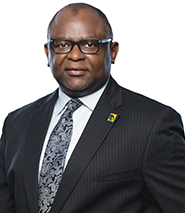Q: What is your outlook for Nigeria’s banking sector in 2020?
A: For the banking industry in Nigeria, 2019 was a very difficult year, albeit better than 2018. There are already signs that 2020 will be a better year than 2019, as there have already been some positive developments.
For the first time since Nigeria returned to democratic rule in 1999, the federal budget – a significant chunk of the national gross domestic product – has been passed and signed into law [and has been effective since January 1].
The second key development is the finance bill that has now become law, which has also happened very quickly. This is another sign that things are picking up and the executive and legislative arms of government are working together more co-operatively.
So our expectation is that the Nigerian economy will grow faster this year, as the International Monetary Fund has forecast. That will cascade down to the banking sector.
Q: The Central Bank of Nigeria began enforcing new regulations on lower banking charges in January 2020. What will be the impact on the sector, and on First Bank of Nigeria?
A: Definitely [the new tariffs regime] will have a negative impact in the short term. In the medium to long term, the impact on the sector will be more positive, because banks will be forced to pursue scale, which will become extremely important, and focus much more on efficiency. This is in line with the goals of the central bank – and indeed the federal government – to significantly increase the level of financial inclusion.
For us, we’re still planning for growth in our bottom line, which is most important for our investors. We believe that we have what it takes to grow our volumes to compensate for the reduction in tariffs, and also to grow in areas that haven’t been affected [by the new tariffs].
Q: Will the new tariffs and other stipulations on loans to deposits lead to consolidation in the sector?
A: I mentioned in my earlier response that banks will have to go for scale. So my sense is that as everyone aspires to build that scale, it will trigger some degree of consolidation in the medium term.
FirstBank processes somewhere between 22% to 24% of the entire volume [of transactions] in the banking sector, which is significant given that there are more than 25 banks operating [here]. So we believe we have that scale, and we [will] continue to build scale to get to where we want to get.
Q: Would FirstBank consider acquisitions to further build that scale?
A: We are in a comfortable position so we can choose to go it alone (as we are today). [But] when there are good opportunities in the market, subject to the approval of our board of directors, we would definitely take a good look at them.
Q: Can you share any guidance on the outlook for your credit portfolio in 2020?
A: As you mentioned, the central bank’s policy [announced in October 2019] is that all banks are required to [achieve] a loan-to-deposit ratio of 65% or higher. A number of banks, including FirstBank, haven’t met that ratio.
So we foresee a situation where credit expansion to the private sector will continue. We are in our closed period so I cannot share our targets for the year.
As I said before, in order for banks to compensate for the reduction in pricing for various services, they will be forced to grow their volume of transactions. So that, invariably, will lead to a growth in deposits.
Q: What impact will the launch of payment service banks [PSBs] have on your business?
A: The jury is still out, as none of them have launched yet. The digital banking space in Nigeria is dominated by banks. More than 80% of our customer-induced transactions today are conducted via digital channels; four years ago, that ratio was less than 30%. We have more than 8.2 million customers carrying out business on a daily basis on our USSD [feature phone] platform, and our smartphone app has more than 3 million daily users.
More fundamental is the progress we’ve made in the area of agency banking; we have more than 45,000 agents that are spread out throughout all the nooks and crannies of Nigeria, with a short-term goal of expanding that network to 50,000.
We look forward to seeing what the PSBs can do, but we believe the banks are already very well positioned to compete with them, especially a bank such as FirstBank.













